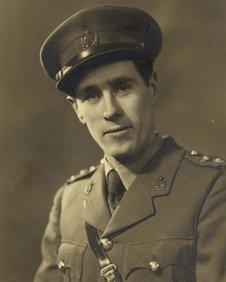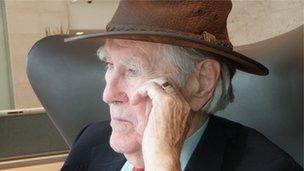Bletchley codebreaker Raymond Roberts appointed MBE
- Published

Capt Roberts has campaigned for his colleagues to be recognised
A Bletchley Park codebreaker who has been appointed MBE in the New Year Honours said he still hopes his whole team will one day be recognised.
Raymond "Jerry" Roberts, 92, receives the honour for services to the WWII decryption centre and to codebreaking.
Mr Roberts, of Hampshire, was among four founder members of the Testery section tasked with breaking the German High Command's Tunny code.
The decrypts are credited with helping shorten the war by at least two years.
Capt Roberts worked at Bletchley Park, Buckinghamshire, until the end of the war then spent two years at the War Crimes Investigation Unit, before moving on to a 50-year career in marketing and research.
'Gesture to guys'
He is now the last survivor of the nine cryptanalysts who worked on Tunny, and has spent the past four years campaigning for acknowledgement of his colleagues.
Capt Roberts, from Liphook, has been working for recognition for Bletchley Park's "4T's" - the Testery as a whole, and three colleagues responsible for major discoveries.
They are Alan Turing who broke the naval Enigma; Bill Tutte who broke the Tunny system to help shorten the war; and Tommy Flowers, who designed and built the Colossus, which sped up some stages of the breaking of Tunny traffic.
Capt Roberts said he and his wife Mei were delighted with the MBE, and he paid tribute to his so-far unrecognised team in the Testery.

Capt Roberts said he and his wife Mei were delighted
Jerry Roberts describes his code breaking work
"I was very pleased and Mei was very pleased - she is delighted," he said.
"She is very pleased that something has come through; we both wish it could have been a bit more, not because we are fixed on titles, but just in gesture to those other guys - the Testery.
"They did a brilliant job, we were breaking 90% of the German traffic through '41 to '45.
"We worked for three years on Tunny material and were breaking, at a conservative estimate, just under 64,000 top line messages.
"It was an exciting time because once you start getting a break on a message and seeing it through and getting it."
Capt Roberts, who has a total of seven children and stepchildren, as well as a grandson, said his family were delighted.
But he said he would like to see the Testery itself formally honoured for its work, adding: "There were 118 of us altogether doing various different functions. There's one other person still alive that I know of."
- Published14 December 2012
- Published20 November 2012
- Published6 September 2012